发布时间:2020.08.09 13:21 访问次数: 作者:
返回列表Ke Jiayun 上海日报SHINE
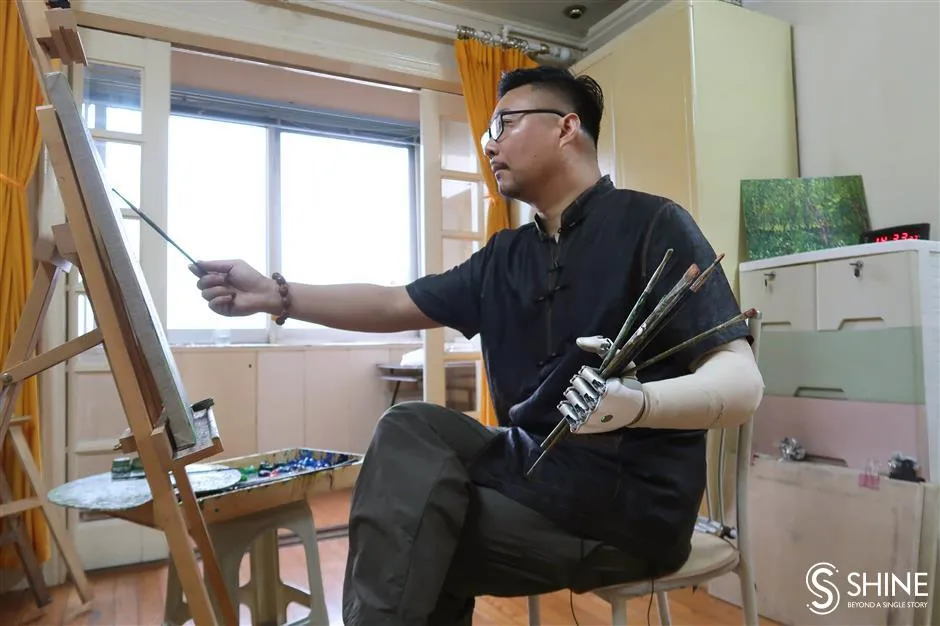
A new robotic arm enables painter Zhang Yuecheng to regain use of his left hand.
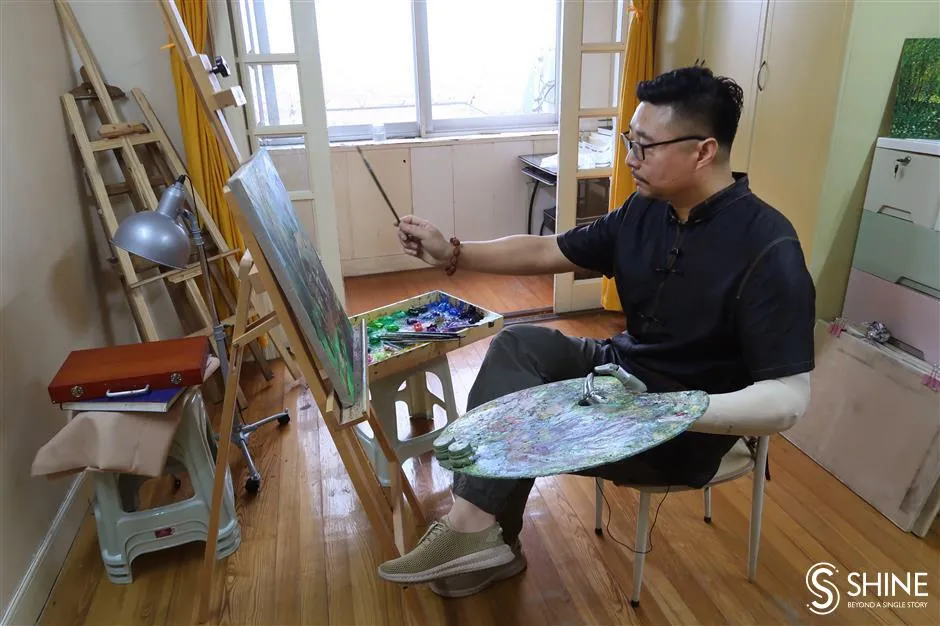
Chinese media call Zhang Yuecheng the “iron arm” of art. The one-armed Shanghai resident uses a metal robotic arm to do sketches and oil painting.
Born in 1981 with no lower left arm, Zhang suffered pain and discrimination growing up. The new robotic arm, which uses artificial intelligence to allow him to perform the movements of a normal person, has raised his confidence and helped erase the difference between himself and others.
There are 24 million physically handicapped people in China, and emerging robotic and “smart” technologies are helping many of them lead normal lives. For Zhang, they are lifesavers.
Zhang showed artistic talent from an early age, but his parents saw no future for him in art because of his disability. They wanted him to seek a career that would bring him security and a steady income.
After graduation, he worked on the support crew at a Shanghai airport. But he never discarded his artistic dreams.
He finally resigned from the airport job in 2003 and started studying painting at a spare-time class, where he met Wang Xinxu, a professor from School of Art and Design at the Shanghai University of Engineering Science.
“He said my passion for painting far surpassed that of many of his students, and he decided to help me on my chosen path,” said Zhang.
With Wang’s help, Zhang enrolled at the Jingdezhen Ceramic Institute three years later. After graduation, he became a landscape designer. It was hard work because he had only one hand.
“Anyway,” he said, “the job allowed me to do more freehand sketching, which laid the foundation for me as a painter.”
He designed the landscape for a theme park in Shanghai’s Yangpu District. After the park opened in 2017, Zhang decided to devote himself to art full time.
“I started painting alone at home and later gave lessons at the weekend,” he told Shanghai Daily.
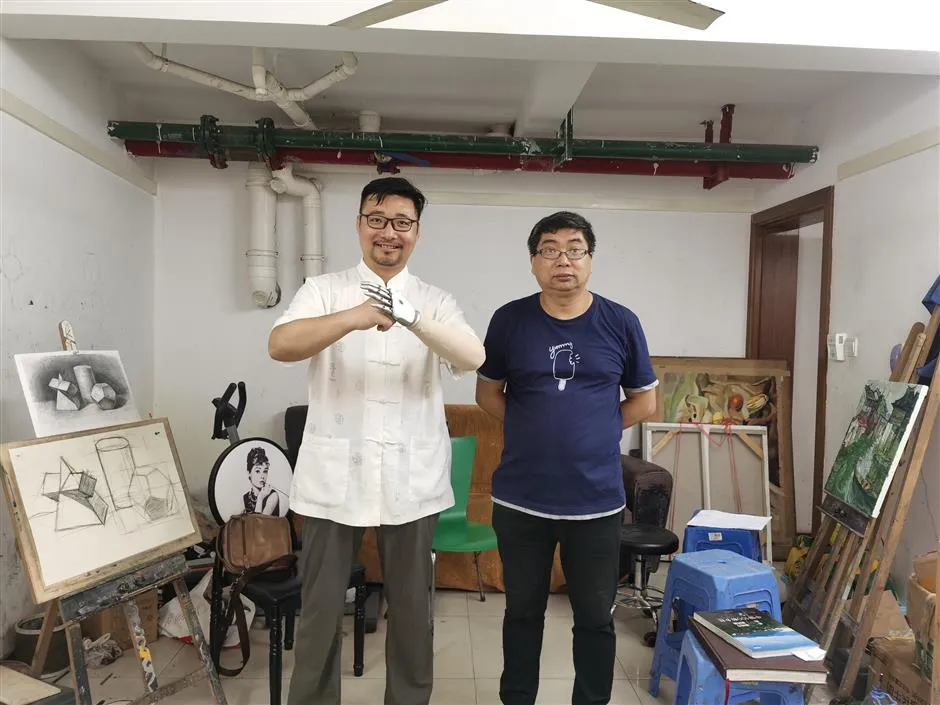
Zhang Yuecheng and professor Wang Xinxu
The lessons included free classes for the elderly at a community school, and won a district award for his charity work.
It was at a charity event that he met people from OYMotion Technologies, a provider of rehabilitation medical technology. The company had developed a robotic arm with biosensors and artificial intelligence technology.
OYMotion’s robot arm, called OHand, is a smart prosthetic hand powered by five small activators that allow each finger to flex separately.
With his bionic arm, Zhang can hold a brush in one hand and a paint palette in the other. To facilitate his outdoor painting, the company provided a customized battery with longer life on the robotic arm.
During the pandemic, Zhang provided online painting courses. His use of a robotic arm captured the imagination of viewers.
“He is different from other students,” said Professor Wang, his mentor. “Although some of them are talented, they don’t have the same passion. Zhang simply loves painting and never gives up.”
He is always encouraging his prize protege to concentrate on finding his own distinctive style.
“He has the potential and persistence,” Wang said. “I always care about him. He is like a family member.”
Wang has encouraged Zhang’s charity work as a means of communicating with more people and experiencing more of life.
Zhang was planning to hold an exhibition tour of his and students’ works but had to postpone it because of the coronavirus pandemic.
According to Liu Jianhua, secretary-general of the Shanghai Foundation for Disabled Persons, there are about 10 million people in China who have lost arms or parts of arms.
Whether caused by birth defects, diseases or accidents, disabilities present huge hurdles in daily life, said Liu. The advent of new technologies to help them overcome handicaps give the disabled new hope.
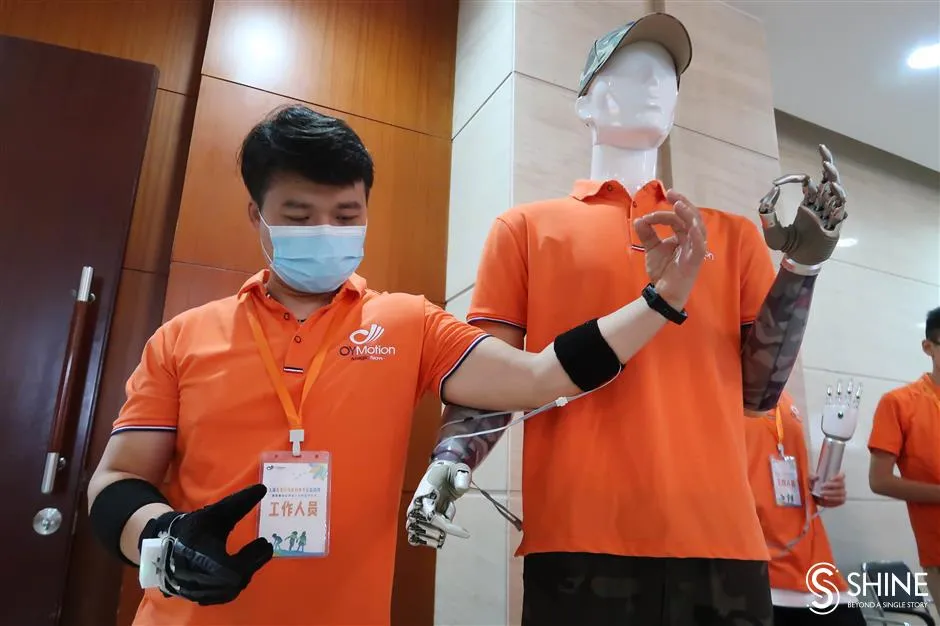
An OYMotion representative exhibits how the company’s robotic arms function.
Stories of the heroic stories of people overcoming disabilities give heart to others.
Yao Fang, 50, was paralyzed from the waist down after a car accident in 1998.
“The car crashed into a tree, and I was thrown from the car,” she said. “Lying there on the ground, I couldn’t feel my legs.”
Years of despair followed. Her husband left her after she became disabled.
The turnaround of her life came in 2002 when Yao was selected as a member of the city’s newly organized wheelchair fencing team. She finished fourth in the women’s individual competition at the Far East and South Pacific Games in South Korea that year, and her team won a bronze medal in the team competition.
The next year, she won a gold medal at the sixth National Games of Disabled Persons in Nanjing. She participated in four National Games and three Paralympics Games, winning many medals.
Though excelling at wheelchair fencing, Yao never lost her dream of being able to stand up again.
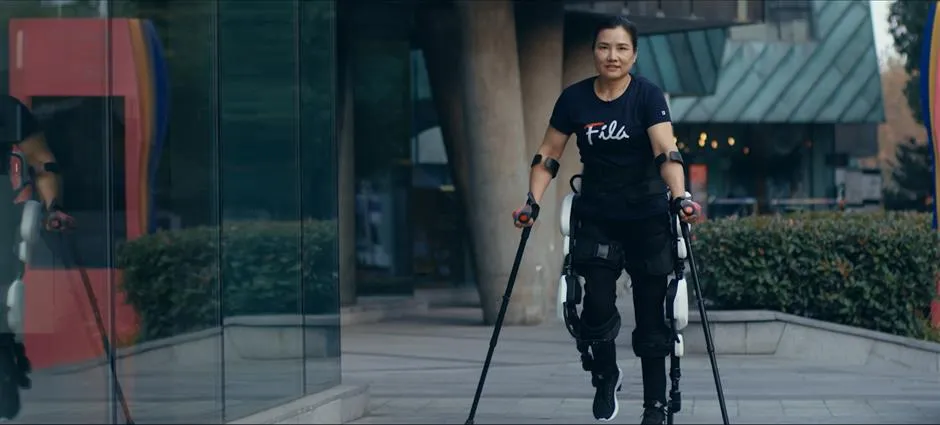
Shanghai Paralympian Yao Fang uses exoskeleton technology from Fourier Intelligence to practice walking.
Last year, she discovered Fourier Intelligence, a Shanghai maker of exoskeleton robots that allow people with debilitating spinal injuries to stand. She volunteered to be a test case for the company.
She used the robotic system six times, suggesting improvements after each trial run. Based on her advice, the robot became lighter and easier to recharge, and the material used in the thigh section was made softer. But the system allowed her to stand up and walk for the first time since her accident.
“I can’t walk like a normal person,” Yao said. “I am hoping that further improvements and upgrades will allow people like me to walk more freely and naturally.”
Yang Zhihao, a manager at Fourier Intelligence, told Shanghai Daily that the company is working with Ruijin Hospital on applying advanced robotic technology to rehabilitation devices.
“The process is a chain of research and development, clinical application and production,” said Yang. “Our company is responsible for development and production. Some research institutes like University of Melbourne & Fourier Intelligence Robotics Lab assist us in research, and hospitals like Ruijin apply that to clinical treatment.”
Besides the exoskeleton robot, the company is developing rehabilitation robotics for upper limbs, ankles, wrists, hands and other body parts.
Other companies are also involved in rehabilitation technologies. Bangbang Robot has developed a “smart scooter” to help paralyzed people and mobility-impaired seniors move around without wheelchairs.
Sonitus Medical’s SoundBite products allow those with hearing impairments to “hear” with their teeth. The aid is fixed on the teeth, with the other end in an ear.

7350344.png)
9481519.png)
8468116.png)
4688731.png)
2988676.png)



TEL: 021-63210200
业务咨询: info@oymotion.com
销售代理: sales@oymotion.com
技术支持: faq@oymotion.com
加入傲意: hr@oymotion.com
上海地址: 上海市浦东新区半夏路100弄788幢
珠海地址: 珠海市高新区唐家湾镇鼎业路82号B05栋5楼

微信号:oymotion
扫描二维码,获取更多相关资讯